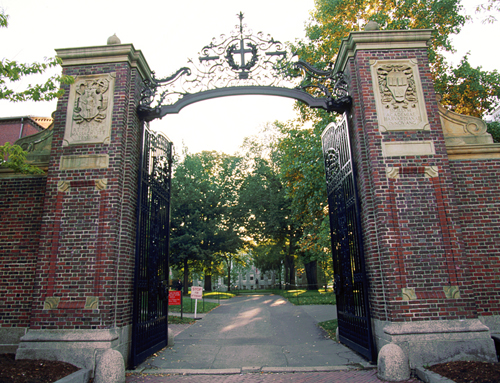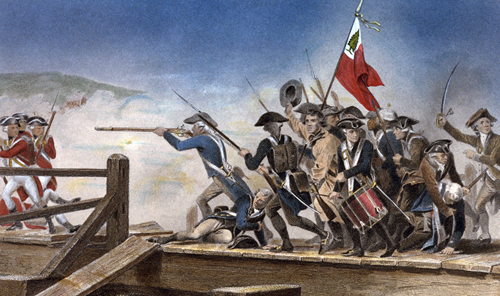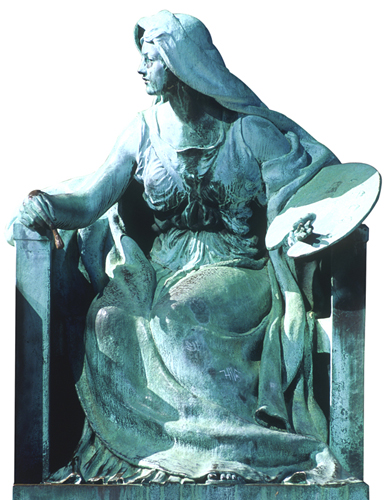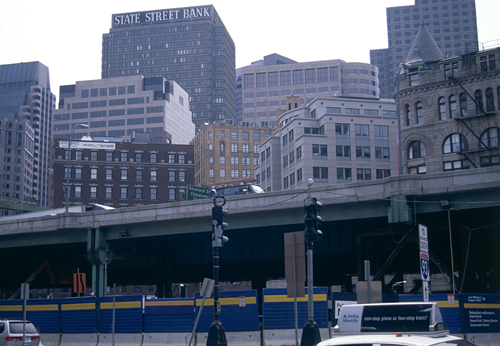1630: Boston Founded Under the leadership of John Winthrop,
English Puritans moved from overcrowded Charlestown and colonized the
Shawmut Peninsula. Permission was granted from its sole English
inhabitant, Anglican cleric William Blaxton. Their city on the hill was
named Boston in honor of the native English town of their leaders. 1636: Harvard Created Boston’s
Puritan leaders established a college at Newtown (later Cambridge) to
educate future generations of clergy. When young Charlestown minister
John Harvard died two years later and left his books and half his money
to the college, it was renamed Harvard.

Gates, Harvard University
1775: American Revolution Friction
between colonists and the British crown had been building for more than
a decade when British troops marched on Lexington to confiscate rebel
weapons. Forewarned by Paul Revere,
local militia, known as the Minute Men, skirmished with British
regulars on Lexington Green. During the second confrontation at Concord,
the shot heard round the world marked the beginning of the Revolution,
which ended in American independence with the 1783 Treaty of Paris.

Battle of Concord Bridge
1845: Irish Arrived Irish
fleeing the potato famine arrived in Boston in tens of thousands, many
eventually settling in the south of the city. By 1900, the Irish were
the dominant ethnic group in Boston. They flexed their political muscle
accordingly, culminating in the election of John F. Kennedy as president in 1960. 1848: Boston Public Library Founded The
Boston Public Library was established as the first publicly supported
municipal library in the US. In 1895 the library moved into the
Italianate “palace of the people” on Copley Square .

Detail, Boston Library
1863: Black Boston Went to War Following
decades of agitation to abolish slavery, the city sent the country’s
first African-American regiment to join Union forces in the Civil War.
The regiment was honored by the Shaw Memorial on Boston Common. 1897: Subway Opened The
Tremont Street subway, the first underground in the US, was opened on
September 1 to ease road congestion. It cost $4.4 million to construct
and the initial fare was five cents. The Metropolitan Boston Transit
Authority (MBTA) now transports 1.2 million people daily. 1958: Freedom Trail Opened This historical walking tour connects the city’s sights. It was based on a 1951 Boston Herald Traveler column by William Scofield, and was the first of its kind in the US. 2004: Sox Win The
Boston Red Sox vercame an alleged 86-year-old sporting curse to win
baseball’s World Series for the first time since 1918. The team thrilled
fans of “Red Sox Nation” by winning again in 2007. 2008: The Big Dig The
$15 billion highway project to alleviate traffic congestion is largely
completed. As a result, the city has gained new park space and the
soaring Zakim Bridge, the world’s widest cable-stayed bridge.

The Big Dig
Top 10 Innovations
Sewing Machine Elias Howe invented the sewing machine in Cambridge in 1845, but spent decades securing patent rights. Surgical Anesthesia Ether was first used for surgical anesthesia at Massachusetts General Hospital in 1846. Telephone Alexander Graham Bell invented the telephone in his Boston laboratory in 1876. Safety Razor Bostonian King Camp Gillette invented the safety razor with disposable blades in 1901. Baby Formula The New England Medical Center devised nutritionally enhanced baby formula in 1919. Mutual Fund Massachusetts
Investors Trust opened in 1924 as the first modern mutual fund that
pooled investor’s money to purchase portfolio stocks. Programmable Digital Computer A
Harvard team built the first programmable digital computer, Mark 1, in
1946. Its 750,000 components weighed about 10,000 lb (454 kg). Microwave Oven A
Raytheon company engineer placed popcorn in front of a radar tube in
1946 and discovered the principle behind the microwave oven. Instant Film Cambridge inventor Edwin Land devised the Polaroid camera, launched in 1948. E-mail Ray Tomlinson, an engineer at Bolt, Beranek, and Newman in Cambridge, sent the first e-mail message in 1971.
|